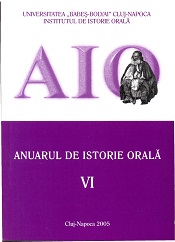„AU FOST ODATĂ...” CONSIDERAŢII PRIVIND EXODUL ETNICILOR GERMANI DIN ROMÂNIA DUPĂ AL II-LEA RĂZBOI MONDIAL
„ONCE UPON A TIME THERE WERE”... REFLECTIONS REGARDING THE EXODUS OF THE GERMAN ETHNICS FOLLOWING THE SECOND WORLD WAR
Author(s): Denisa Florentina BodeanuSubject(s): History
Published by: Argonaut
Summary/Abstract: The study investigates on the basis of verbal testimonies the causes, phases and consequences of the departure of the German ethnics from Romania. The subject is of great interest to both the Romanian and foreign historians and it attempts to explain the way in which the number of German ethnics from Romania has decreased over a relatively short period of time (1940-1990). Three phases can be noted in the process of emigration of the German ethnics: - The first phase- refers to those who left during the Second World War and during the years that immediately followed, either by joining the army, or by way of imprisonment, refuge, desertion, deportation and repatriation. - The second phase covers those who emigrated between 1950-1989 as a result of the normalization of international relations, the institution, consolidation and collapse of the communist regime in Romania. - The third phase includes those who left Romania after the 1989 Revolution. The main destination of the German ethnics was the Federal Republic of Germany. The economic development of this state, the great consideration the German ethnics originating from communist countries benefited from (in the form of substantial financial aids), and not to mention the language and spiritual union, account for the great appeal posed by this state. As for the causes that determined the German ethnics to leave Romania during the communist period, an analysis of the verbal testimonies and of the reference documents on this topic reveals the fact that although the main reasons for the departure of the German ethnics were the measures taken by the Romanian authorities against the German population (deportation, the agrarian law, nationalization) in the years that immediately followed the second world war and the desire to reunite with their families, starting with the ’70 and up to 1989 it was the economic motivation that prevailed. The change of the political regime led to the continuation of the mass departure that ultimately reached incredible proportions. Nowadays, the continuation of the emigration process, the loss and estrangement that occurred in the relations between the German ethnics that remained in Romania and those who departed, the assimilation tendencies and the largely aged population of German ethnics are but a few of the problems the German minority in Romania has to face. To solve them, the joint efforts of both the Romanian state and of the ethnic German emigrants originating from Romania, without which the presence of Germans on Romanian grounds will remain only a memory, are rendered crucial.
Journal: Anuarul Institutului de Istorie Orală
- Issue Year: 2005
- Issue No: VI
- Page Range: 193-210
- Page Count: 18
- Language: Romanian

